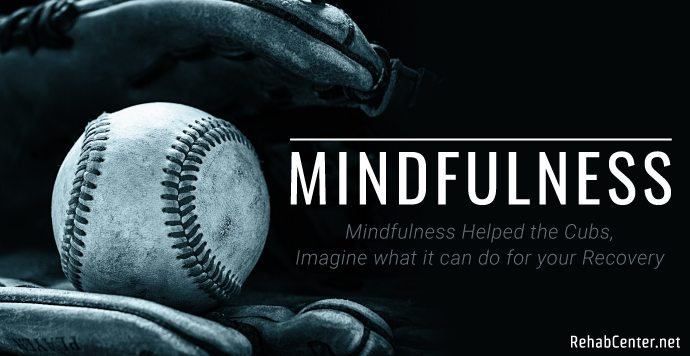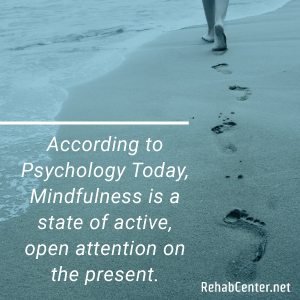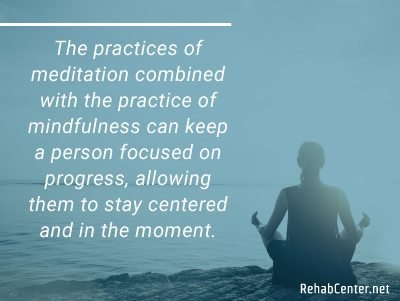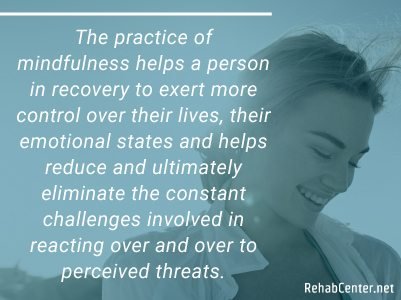Mindfulness Helped the Cubs, Imagine What It Can Do For Your Recovery

In today’s world full of trends in recovery, self-help and self-improvement, one thing that is talked about is: Mindfulness.
- What exactly is mindfulness?
- How can it be applied to recovery, and are there any concrete examples of how this practice can help us overcome our challenges and create the life we want?
The answers may surprise you.
What is Mindfulness?
 According to Psychology Today, Mindfulness is a state of active, open attention on the present. When you’re mindful, you observe your thoughts and feelings from a distance, without judging them good or bad. Instead of letting your life pass you by, mindfulness means living in the moment and awakening to experience.
According to Psychology Today, Mindfulness is a state of active, open attention on the present. When you’re mindful, you observe your thoughts and feelings from a distance, without judging them good or bad. Instead of letting your life pass you by, mindfulness means living in the moment and awakening to experience.
The Case of the Cubs
The Chicago Cubs had not won a World Series in 108 years. Their franchise was in need of a new approach, so two years ago the ownership and management brought in a specialist in mindfulness, meditation and the practices of yoga and Tai Chi.
Below is a 2 minute video detailing some of the approach that the Cubs used to increase mindfulness and to become more mentally and emotionally present:
https://www.youtube.com/watch?v=8cW9iywg7Ac
How did the Cubs use this approach?
Their team slogans are as follows:
- Embrace the Target
- Permit the Pressure to Exceed the Pleasure
- Authenticity
- Don’t Forget the Heartbeat
- In Blue, Out Red
- Set your Intention
- Process
Through this practice, the Cubs players were able to:
- Reduce anxiety, which can be a real distraction in professional sports.
- They were also able to remain focused during intense games allowing them to perform at peak efficiency even under very stressful moments in the game, and
- They learned to believe that their vision of a World Series win was possible.
How does this Apply to Recovery?
Recovery from Addiction can be stressful in a lot of ways that are amplified once you stop using your drug of choice. In many cases, drug use was a process of self-medicating in order to avoid being uncomfortable whether physical or emotional. When people stop using, these uncomfortable feelings can sometimes become front and center in our lives.
Some of the biggest challenges people discover when they stop using are present long after any physical withdrawal.
These Include:
- Increased Anxiety
- Depression
- Low Self Esteem and Poor Self Image
- Irritability
- Short Temper/Angry Outbursts
- Overwhelming Feelings Associated with Putting your Life Back Together
- Difficulty Envisioning a Different way of Living
- Returning Again and Again to Old and Familiar Habits and Ways of Behaving without the Ability to Notice when this is Happening
Mindfulness can address each of these challenges head on. The practices of meditation and physical activity such as yoga, Tai Chi or exercise when combined with the practice of mindfulness and visualization can keep a person focused on progress, allowing them to stay centered and in the moment.

Much like a professional athlete, a person in recovery is trying to win the World Series of their lives. They are going up against opponents in their hearts and minds that over the years have “gone pro” over the course of their addiction. Like the athletes, remaining centered and present, the very practice of mindfulness, can allow people to work through these challenges through welcoming them, acknowledging them and working through them.
What Mindfulness Helps People Overcome
The practice of mindfulness allows people a freedom in their recovery and in their lives that allows people to be at peace with experiencing previously terrifying emotional states such as:
- Fear
- Anxiety
- Depression
- Harsh Self-Judgement
- Blame of Others
Introducing
virtual care
Get treatment when
and how you need it.
Mindfulness as a Release from Judgement
Mindfulness is not a one size fits all process. Every person is different, but there are some general principles that work:
- Becoming Aware when Strong Emotions Happen
- Looking at these Emotions from an Objective Perspective allowing for a Safe Distance from which to Observe the Feelings without Judgement
- Learning to Take Notice of Tension in the Body as it is Happening and Learning to Notice this Earlier and Earlier Over Time
- Learning to Allow Emotions Knowing that they will Not Last Forever
- Taking a Pause Between Stimulus and Response
Pausing Reduces Reacting:
In Addiction, the using response is often automatic whatever the addiction might be.
The Addictive Reaction Process Looks Like This:
Negative Stimulus → Reaction
(stress, anger, anxiety…) (using, angry outbursts…)
The Mindful Response Process Looks Like This:
Negative Stimulus → Mindfulness → Thoughtful Response
(stress, anger, anxiety…) (awareness of feelings) (you decide how to respond)
This relieves a person from:
- Guilt from Lashing out or Relapsing
- Anger at one’s Self for Outbursts/Uncontrolled Reactions

The practice of mindfulness helps a person in recovery to exert more control over their lives, their emotional states and helps reduce and ultimately eliminate the constant challenges involved in reacting over and over to perceived threats.
This Helps a Person Create a Life With:
- Better Relationships
- Meaningful Self-Control Mechanisms
- Better Self Esteem and Self Image
- A Bridge Between How you Perceive Who You Are and Who You Actually Are
- Attention Regulation
- Sensory Awareness
- Emotional Regulation (i.e., values clarification, increased cognitive, emotional, and behavioral flexibility)
- Less Impulsive Behavior
- Personal De-Centering (i.e., ability to perceive one’s self without judgement)
In the past two decades, mindfulness has been incorporated into a variety of therapies, including:
- Dialectical Behavior Therapy (DBT)
- Mindfulness-Based Cognitive Therapy (MBCT)
- Acceptance and Commitment Therapy (ACT)
- Mindfulness-Based Stress Reduction Program (MBSR)
- Mindfulness-Based Relapse Prevention (MBRP)
Whether you are trying to win the World Series or build a life that is relapse proof, mindfulness can be a fantastic tool to take you down the road to your greatest life, your greatest dreams and your greatest inner peace.
I leave you with this quote from Cubs Pitcher, David Ross:
“Make sure you’re in the present. Don’t be in the past. Don’t be in the future.” Ross continued, “Good teams stay in the present and what’s going on right now. They stay focused on the day, the at-bat, the pitch,”
For More From Expert Writer Adam C. DeVaney, Be Sure To Check Out These Additional Resources From RehabCenter.net:
- What is a Drug Court?
- Medication Assisted Treatment for Opioid Use Disorders
- Questions and Answers on Buprenorphine Maintenance Therapy for Opioid Use Disorder
- Walking Through the Buprenorphine Treatment Process
- Buprenorphine/Naloxone Treatment for Opioid Use Disorders Case Study: Jeff
Sources
Sports Mockery – Have You Noticed The Cubs Keep Pointing At The Bases, Here’s Why
Cubs Insider – The Neuroscience Behind Cubs’ Mindfulness and Mental Skills Initiatives




